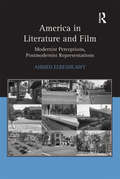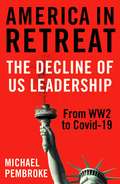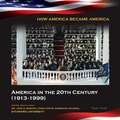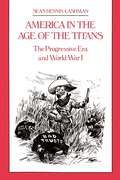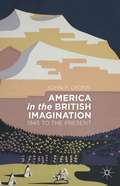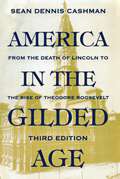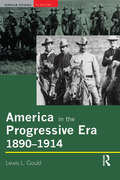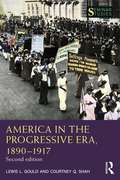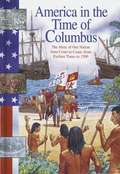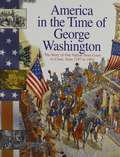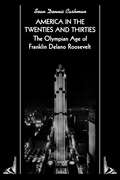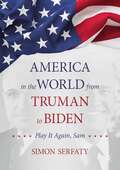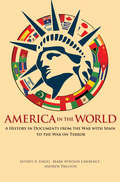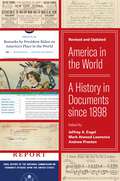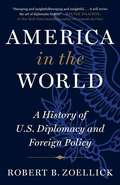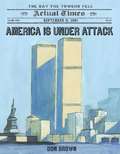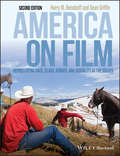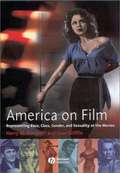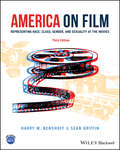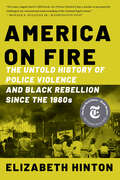- Table View
- List View
America in Literature and Film: Modernist Perceptions, Postmodernist Representations
by Ahmed ElbeshlawyUtilizing Lacan's psychoanalytic theory and Zizek's philosophical adaption of it, this book brings into dialogue a series of modernist and postmodernist literary works, films, and critical theory that are concerned with defining America. Ahmed Elbeshlawy demonstrates that how America is perceived in certain texts reveals not only the idealization or condemnation of it, but an imago, or constructed image of the perceiver as well. In turn, texts which particularly focus on demonstrating how other texts about America communicate an untrustworthy message themselves communicate an unreliable message, inventing and reinventing a series of imagos of America. These imagos refer to both idealized and deformed images of America constructed by the perceivers of America. The first part of this book is concerned with modernist perceptions of America, and includes discussion of Adorno, Benjamin, Kafka, D. H. Lawrence, as well as Emerson and Seymour Martin Lipset. The second part is dedicated to postmodernist representations of America, focusing on texts by Edward Said, Ihab Hassan, Susan Sontag, David Shambaugh and Charles W. Brooks, and films including Lars von Trier's Dogville and D.W. Griffith's Birth of a Nation.
America in Retreat: The Decline of US Leadership from WW2 to Covid-19
by Michael PembrokeIn the heady days after 1945, the authority of the United States was unrivalled and, with the founding of the UN, a new era of international co-operation seemed to have begun. But seventy-five years later, its influence has already diminished. The world has now entered a post-American era, argues Michael Pembroke, defined by a flourishing Asia and the ascendancy of China, as much as by the decline of the United States. This book is a short history of that decline; how high standards and treasured principles were ignored; how idealism was replaced by hubris and moral compromise; and how adherence to the rule of law became selective. It is also a look into the future – a future dominated by greater Asia and China in particular. We are in the midst of the third great power shift in modern history – from Europe to America to Asia. Covering wars in Korea, Vietnam, Iraq and Afghanistan, interventions in Iran, Guatemala and Chile, and a retreat from international engagement with the UN, WHO and, increasingly, trade agreements, Pembroke sketches the history of America&’s retreat from universal principles to provide a clear-eyed analysis of the dangers of American exceptionalism.
America in Search of Itself (Making of the President Ser. #5): The Making of the President 1956-1980
by Theodore H. WhiteAll of us have lived through a time of collision in America: of upheavals shattering old ideas and dreams-- transforming American politics in the process. In this, the last of his prize-winning series on American presidential politics, Theodore H. White tells us of the dramas that lie behind that transformation. He sets the stage by describing the forces that have changed American politics in the twenty-five years of his reporting. He tells how American goodwill created something called the Great Society... and pushed it over the cliff. He reveals how television took over American politics--and changed its nature; and he tells the terrifying story of the Great Inflation--and how it came to undermine all American life. And he details the equally disturbing story of how Americans have been ripped apart, divided and set against each other by the hopes that inspired men of goodwill to try to bring Americans together.
America in the 20th Century (How America Became America)
by Victor SouthThe United States' boundaries have expanded over the centuries--and at the same time, Americans' ideas about their country have grown as well. The nation the world knows today was shaped by centuries of thinkers and events. Today, the United States of America is the lone super power in the world. The United States is very strong. Power, however, is not the only thing that comes with being a world leader. As a world leader, America also has a lot of responsibility to the rest of the world. In the twentieth century, the United States struggled to balance its power with its responsibility in new ways.
America in the Age of the Titans: The Progressive Era and World War I
by Sean Dennis CashmanDetailing the events of the Progressive Era and World War I (1901-20), America in the Age of the Titans is the only interdisciplinary history covering this period currently available. The book contains the results of research into primary sources an drecent scholarship with an emphases on leading personalities and anecdotes about them. Sean Dennis Cashman's sequesl to America in the Gilded Age gives special attention to industry and inventions, and social and cultural history. He covers developments in science, technology, and industry; the Progressive movement and the presidencies of Theodore Roosevelt, immigration, the new woman, and labor, including the Industrial Workers of the World and the Great Red Scare; the transportation and communications revolution in radio and motion pictures; the cultural contribuation of artists, architects, and creatice writers; and America's foreign policies across the world. Written in a lively, accessible style with over sixty illustrations, this book is an excellent introduction to these momentous years. It provides an assessment of the contributions of the titans - political, scientific, and industrial.
America in the British Imagination
by John F. LyonsHow was American culture disseminated into Britain? Why did many British citizens embrace American customs? And what picture did they form of American society and politics? This engaging and wide-ranging history explores these and other questions about the U. S. 's cultural and political influence on British society in the post-World War II period.
America in the Gilded Age: Third Edition
by Sean Dennis Cashman&“A lively, often entertaining and generally well-balanced treatment . . . enlivened by the lavish use of colorful, often amusing, anecdotes.&” —History When the first edition of America in the Gilded Age was published in 1984, it soon acquired the status of a classic, and was widely acknowledged as the first comprehensive account of the latter half of the nineteenth century to appear in many years. Sean Dennis Cashman traces the political and social saga of America as it passed through the momentous transformation of the Industrial Revolution and the settlement of the West. Revised and extended chapters focusing on immigration, labor, the great cities, and the American Renaissance are accompanied by a wealth of augmented and enhanced illustrations, many new to this new edition. &“A lucid and perceptive examination . . . a fine synthesis of primary research and recent scholarship that emphasizes personalities of the age without slighting the overriding issues . . . [It] should delight students.&” —Journal of Economic History &“Clear, graceful, and lively. An excellent collection of photographs enhances [the text].&” —The Historian
America in the Progressive Era, 1890-1914
by Lewis L. GouldAmerica in the Progressive Era, 1890-1914 provides a readable, analytical narrative of the emergence, influence, and decline of the spirit of progressive reform that animated American politics and culture around the turn of the twentieth century. Covering the turbulent 1890s and the era of Theodore Roosevelt and Woodrow Wilson, the book covers the main political and policy events of a period which set the agenda for American public life during the remainder of the twentieth century. Key features include:- A clear account of the continuing debate in the United States over the role of government and the pursuit of social justice- A full examination of the impact of reform on women and minorities- A rich selection of documents that allow the historical actors to communicate directly to today's reader- An extensive Bibliography providing a valuable guide to additional reading and further research Based on the most recent scholarship and written to be read by students, America in the Progressive Era makes this turbulent period come alive.
America in the Progressive Era, 1890–1917 (Seminar Studies)
by Lewis L. Gould Courtney Q. ShahNow in its second edition, America in the Progressive Era, 1890–1917 provides a readable, analytical narrative of the emergence, influence, and decline of the spirit of progressive reform that animated American politics and culture around the turn of the twentieth century. Covering the turbulent 1890s to the American entry into World War I, the text examines the political, social, and cultural events of a period which set the agenda for American public life during the remainder of the twentieth century. This new edition places progressivism in a transatlantic context and gives more attention to voices outside the mainstream of party politics. Key features include: A clear account of the continuing debate in the United States over the role of government, citizenship, and the pursuit of social justice A full examination of the impact of reform on women and minorities A rich selection of documents that allow the historical actors to communicate with today’s readers An extensive, updated bibliography providing a valuable guide to additional reading and research Based on the most recent scholarship and written to be read by students, this book will be of interest to students of American History and Political History.
America in the Time of Columbus: From Earliest Times to 1590
by Sally IsaacsUses the life of Christopher Columbus as a backdrop to present the history of the people of America from the time the Native Americans arrived until 1590.
America in the Time of Franklin Delano Roosevelt, 1929-1948
by Sally Senzell Isaacs<P>America in the Time of... helps readers explore our nation's past by focusing on key figures in history. Each visually stunning spread features clearly written text that explains the social, political, and economic realities of the time. The series visits all areas of the United States from coast to coast, and offers information about the native as well as invading and immigrant peoples. Each book features: <br>-- beautiful reconstruction artwork, <br>-- authentic primary source photographs, <br>-- detailed maps, both modern and historical, <br>-- profiles of famous people who shaped that time, <br>-- a list of noteworthy places, and <br>-- a bibliography of fiction books to extend learning.
America in the Time of George Washington, 1747 to 1803
by Sally Senzell IsaacsBuilding a new nation is far from easy. Meet Americans such as George Washington, Thomas Jefferson, and Benjamin Franklin. Also learn about the groups, such as Native Americans, African Americans, and others.
America in the Time of Martin Luther King Jr. (1948-1976)
by Sally Senzell IsaacsAmerica in the Time of is a series of nine books arranged chronologically, meaning that events are described in the order in which they happened. In each book, most articles deal with a particular event or part of American history. This book is about America from 1948 to 1976.
America in the Time of Susan B. Anthony
by Sally Senzell IsaacsUses the life of Susan B. Anthony as a reference to examine the development of the United States from 1845 to 1928.
America in the Twenties and Thirties: The Olympian Age of Franklin Delano Roosevelt
by Sean Dennis CashmanIn this, the third volume of an interdisciplinary history of the United States since the Civil War, Sean Dennis Cashman provides a comprehensive review of politics and economics from the tawdry affluence of the 1920s throught the searing tragedy of the Great Depression to the achievements of the New Deal in providing millions with relief, job opportunities, and hope before America was poised for its ascent to globalism on the eve of World War II. The book concludes with an account of the sliding path to war as Europe and Asia became prey to the ambitions of Hitler and military opportunists in Japan. The book also surveys the creative achievements of America's lost generation of artists, writers, and intellectuals; continuing innovations in transportation and communications wrought by automobiles and airplanes, radio and motion pictures; the experiences of black Americans, labor, and America's different classes and ethnic groups; and the tragicomedy of national prohibition. The cast of characters includes FDR, the New Dealers, Eleanor Roosevelt, George W. Norris, William E. Borah, Huey Long, Henry Ford, Clarence Darrow, Ernest Hemingway, Scott Fitzgerald, W.E.B. DuBois, A. Philip Randolph, Orson Welles, Wendell Willkie, and the stars of radio and the silver screen. The first book in this series, America in the Gilded Age, is now accounted a classic for historiographical synthesis and stylisic polish. America in the Age of the Titans, covering the Progressive Era and World War I, and America in the Twenties and Thirties reveal the author's unerring grasp of various primary and secondary sources and his emphasis upon structures, individuals, and anecdotes about them. The book is lavishly illustrated with various prints, photographs, and reproductions from the Library of Congress, the Museum of Modern Art, and the Whitney Museum of American Art.
America in the Twenties: A History
by Geoffrey PerretEveryone knows the Twenties: flappers, jazz bands, the Charleston, teacups filled with bathtub gin-one long party and everyone had a hangover (known as the Depression) in the morning. The Twenties are both the most derided decade in American history and the most glamorous. It has been a pleasant experience to be told "How interesting" when people wanted to know what I was writing. They often elaborated with remarks such as "What a wonderfully decadent time!" or "That was the last time Americans really knew how to enjoy themselves." Almost without exception the hundred or more people who've asked me about this book had a firm, unshakable idea of what the period was like. I had begun with much the same idea myself. I thought of the Twenties as a period that had been "done"-to a turn.
America in the World from Truman to Biden: Play it Again, Sam
by Simon SerfatyDoes America still count in the world? Can the world still count on America? In raising such questions halfway into a series of systemic shocks that began in September 2001, Simon Serfaty, a long-time scholar of international politics, reminds Americans that their country’s well-being and that of the world are intertwined. Play it again, Sam: History is in a foul mood again, and this is no time to come home and leave behind an unfinished European Union facing the ghosts of a revanchist Russia still claiming the Old World as its own; a strategic dark hole in the Greater Middle East, on the eve of a global Sarajevo moment; and China’s surging hegemonic power in a continent fraught with too much history and too little geography. Admittedly, what is good for America may no longer be best for all the West, and what is good for the West may no longer be good for much of the Rest: the unipolar moment is irreversibly over. Yet, writing in an elegant style and with much historical insight, Serfaty argues that even with the old power map irreversibly gone, mainly to the benefit of the non-Western world, a new world order for the twenty-first century will remain dependent on the U.S. role, its capabilities and its efficacy, as well as its leadership and its purpose.
America in the World: A History in Documents from the War with Spain to the War on Terror (America in the World #14)
by Jeffrey A. Engel, Mark Atwood Lawrence and Andrew PrestonA one-of-a-kind anthology of primary texts in American foreign relationsHow should America wield its enormous power beyond its borders? Should it adhere to grand principles or act on narrow self-interest? Should it partner with other nations or avoid entangling alliances? Americans have been grappling with questions like these throughout the nation's history, and especially since the emergence of the United States as a major world power in the late nineteenth century. America in the World illuminates this history by capturing the diverse voices and viewpoints of some of the most colorful and eloquent people who participated in these momentous debates.Spanning the era from the Gilded Age to the Obama years, this unique reader collects more than two hundred documents—everything from presidential addresses and diplomatic cables to political cartoons and song lyrics. It encompasses various phases of American diplomatic history that are typically treated separately, such as the First World War, the Cold War, and 9/11. The book presents the perspectives of elite policymakers—presidents, secretaries of state, generals, and diplomats—alongside those of other kinds of Americans, such as newspaper columnists, clergymen, songwriters, poets, and novelists. It also features numerous documents from other countries, illustrating how foreigners viewed America&’s role in the world.Ideal for classroom use, America in the World sheds light on the complex interplay of political, economic, ideological, and cultural factors underlying the exercise of American power on the global stage.Includes more than two hundred documents from the late nineteenth century to todayLooks at everything from presidential addresses to political cartoons and song lyricsPresents diverse perspectives, from elite policymakers to clergymen and novelistsFeatures documents from outside the United States, illustrating how people in other countries viewed America&’s role in the world
America in the World: A History in Documents since 1898, Revised and Updated
by Jeffrey A. Engel, Mark Atwood Lawrence, and Andrew PrestonA wide-ranging anthology of primary texts in American foreign relations—now expanded to include documents from the Trump years to todayHow should America wield its power beyond its borders? Should it follow grand principles or act on narrow self-interest? Should it work in concert with other nations or avoid entangling alliances? America in the World captures the voices and viewpoints of some of the most provocative, eloquent, and influential people who participated in these and other momentous debates. Now fully revised and updated, this anthology brings together primary texts spanning a century and a half of U.S. foreign relations, illuminating how Americans have been arguing about the nation&’s role in the world since its emergence as a world power in the late nineteenth century.Features more than 250 primary-source documents, reflecting an extraordinary range of viewsIncludes two new chapters on the Trump years and the return of great power rivalries under BidenSweeps broadly from the Gilded Age to emerging global challenges such as COVID-19Shares the perspectives of presidents, secretaries of state, and generals as well as those of poets, songwriters, clergy, newspaper columnists, and novelistsAlso includes non-American perspectives on U.S. power
America in the World: A History of U.S. Diplomacy and Foreign Policy
by Robert B. ZoellickAmerica has a long history of diplomacy–ranging from Benjamin Franklin, Alexander Hamilton, and Thomas Jefferson to Henry Kissinger, Ronald Reagan, and James Baker–now is your chance to see the impact these Americans have had on the world. Recounting the actors and events of U.S. foreign policy, Zoellick identifies five traditions that have emerged from America's encounters with the world: the importance of North America; the special roles trading, transnational, and technological relations play in defining ties with others; changing attitudes toward alliances and ways of ordering connections among states; the need for public support, especially through Congress; and the belief that American policy should serve a larger purpose. These traditions frame a closing review of post-Cold War presidencies, which Zoellick foresees serving as guideposts for the future.Both a sweeping work of history and an insightful guide to U.S. diplomacy past and present, America in the World serves as an informative companion and practical adviser to readers seeking to understand the strategic and immediate challenges of U.S. foreign policy during an era of transformation.
America is Under Attack: The Day the Towers Fell - September 11, 2001
by Don Brown<P><P>On the ten year anniversary of the September 11 tragedy, a straightforward and sensitive book for a generation of readers too young to remember that terrible day. <P><P> The events of September 11, 2001 changed the world forever. In the fourth installment of the Actual Times series, Don Brown narrates the events of the day in a way that is both accessible and understandable for young readers. <P><P>Straightforward and honest, this account moves chronologically through the morning, from the terrorist's plane hijackings to the crashes at the World Trade Center, the Pentagon, and Pennsylvania; from the rescue operations at the WTC site in New York City to the collapse of the buildings.
America on Film
by Harry M. Benshoff Sean GriffinAmerica on Film: Representing Race, Class, Gender, and Sexuality in the Movies, 2nd Edition is a lively introduction to issues of diversity as represented within the American cinema. Provides a comprehensive overview of the industrial, socio-cultural, and aesthetic factors that contribute to cinematic representations of race, class, gender, and sexuality Includes over 100 illustrations, glossary of key terms, questions for discussion, and lists for further reading/viewing Includes new case studies of a number of films, including Crash, Brokeback Mountain, and Quinceañera
America on Film: Representing Race, Class, Gender, and Sexuality at the Movies
by Harry M. Benshoff Sean GriffinAmerica on Film: Representing Race, Class, Gender, and Sexuality in the Movies is a lively introduction to issues of diversity as represented within the American cinema. Introduces issues of diversity as represented within the American cinema in a lively and accessible manner. Provides a comprehensive overview of the industrial, socio-cultural, and aesthetic factors that contribute to cinematic representations of race, class, gender, and sexuality. Is designed specifically for students and includes 101 illustrations, a glossary of key terms, questions for discussion, and lists for futher reading and further viewing. Includes case studies of a number of films, including The Lion King, The Jazz Singer, Smoke Signals, The Grapes of Wrath, and The Celluloid Closet. Each chapter features a concise overview of the topic at hand, a discussion of representative films, figures, and movements, and an in-depth analysis of a single film.
America on Film: Representing Race, Class, Gender, and Sexuality at the Movies
by Harry M. Benshoff Sean GriffinA comprehensive and insightful examination of the representation of diverse viewpoints and perspectives in American cinema throughout the 20th and 21st centuries America on Film: Representing Race, Class, Gender and Sexuality at the Movies, now in its third edition, is an authoritative and lively examination of diversity issues within American cinema. Celebrated authors and academics Harry M. Benshoff and Sean Griffin provide readers with a comprehensive discussion and overview of the industrial, socio-cultural, and aesthetic factors that contribute to cinematic representations of race, class, gender, sexuality, and ability. The book incorporates several different theoretical perspectives, including film genre, auteurism, cultural studies, Orientalism, the "male gaze," feminism, and queer theory. The authors examine each selected subject via representative films, figures, and movements. Each chapter also includes an in-depth analysis of a single film to illuminate and inform its discussion of the chosen topic. America on Film fearlessly approaches and tackles several controversial areas of representation in film, including the portrayal of both masculinity and femininity in film and African- and Asian-Americans in film. It devotes the entirety of Part V to an analysis of the depiction of sex and sexuality in American film, with a particular emphasis on the portrayal of homosexuality. Topics covered include: The structure and history of American filmmaking, including a discussion of the evolution of the business of Hollywood cinema African Americans and American film, with a discussion of BlacKkKlansman informing its examination of broader issues Asian, Latin/x, and Native Americans on film Classical Hollywood cinema and class, with an in-depth examination of The Florida Project Women in classical Hollywood filmmaking, including a discussion of the 1955 film, All that Heaven Allows Perfect for undergraduate and graduate students in film, media, and diversity-related courses, the book also belongs on the shelves of anyone interested in diversity issues in the context of American studies, communications, history, or gender studies. Lastly, it's ideal for use within corporate diversity training curricula and human relations training within the entertainment industry.
America on Fire: The Untold History Of Police Violence And Black Rebellion Since The 1960s
by Elizabeth HintonFrom one of our top historians, a groundbreaking story of policing and “riots” that shatters our understanding of the post–civil rights era. <P><P> What began in spring 2020 as local protests in response to the killing of George Floyd by Minneapolis police quickly exploded into a massive nationwide movement. Millions of mostly young people defiantly flooded into the nation’s streets, demanding an end to police brutality and to the broader, systemic repression of Black people and other people of color. To many observers, the protests appeared to be without precedent in their scale and persistence. Yet, as the acclaimed historian Elizabeth Hinton demonstrates in America on Fire, the events of 2020 had clear precursors—and any attempt to understand our current crisis requires a reckoning with the recent past. <P><P>Even in the aftermath of Donald Trump, many Americans consider the decades since the civil rights movement in the mid-1960s as a story of progress toward greater inclusiveness and equality. Hinton’s sweeping narrative uncovers an altogether different history, taking us on a troubling journey from Detroit in 1967 and Miami in 1980 to Los Angeles in 1992 and beyond to chart the persistence of structural racism and one of its primary consequences, the so-called urban riot. Hinton offers a critical corrective: the word riot was nothing less than a racist trope applied to events that can only be properly understood as rebellions—explosions of collective resistance to an unequal and violent order. As she suggests, if rebellion and the conditions that precipitated it never disappeared, the optimistic story of a post–Jim Crow United States no longer holds. <P><P>Black rebellion, America on Fire powerfully illustrates, was born in response to poverty and exclusion, but most immediately in reaction to police violence. In 1968, President Lyndon Johnson launched the “War on Crime,” sending militarized police forces into impoverished Black neighborhoods. Facing increasing surveillance and brutality, residents threw rocks and Molotov cocktails at officers, plundered local businesses, and vandalized exploitative institutions. Hinton draws on exclusive sources to uncover a previously hidden geography of violence in smaller American cities, from York, Pennsylvania, to Cairo, Illinois, to Stockton, California. <P><P>The central lesson from these eruptions—that police violence invariably leads to community violence—continues to escape policymakers, who respond by further criminalizing entire groups instead of addressing underlying socioeconomic causes. The results are the hugely expanded policing and prison regimes that shape the lives of so many Americans today. Presenting a new framework for understanding our nation’s enduring strife, America on Fire is also a warning: rebellions will surely continue unless police are no longer called on to manage the consequences of dismal conditions beyond their control, and until an oppressive system is finally remade on the principles of justice and equality.
